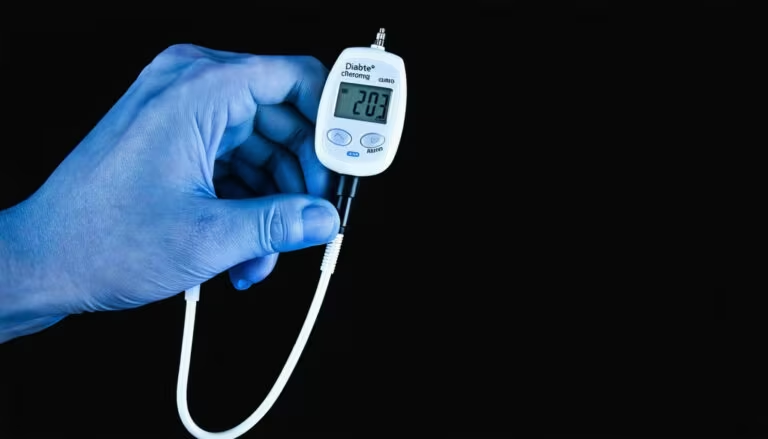The Link Between Diabetes and Dementia
Diabetes and dementia are two very common health problems affecting millions worldwide. Recent research shows a strong link between diabetes and dementia, even though they might seem different at first glance. To prevent Alzheimer’s / Dementia and provide better care for those with both conditions, it’s crucial to understand this connection.
Demystifying Dementia
Dementia makes thinking and remembering things tough, disrupting daily life. It’s not just one illness but a term that covers various issues impacting memory, thinking, and reasoning. The most common form is Alzheimer’s disease, which causes protein plaques and tangles in the brain, gradually eroding cognitive skills. Other types include vascular dementia—from insufficient blood flow—and Lewy body dementia, linked to abnormal protein buildup.
The Diabetes-Dementia Link
Research often highlights that people with diabetes, especially type 2 diabetes, have a higher risk of developing dementia. We’re still exploring this connection deeply, but some possible explanations include:
- Blood Vessel Damage: Both diabetes & dementia often result from blood flow issues. High blood sugar can damage vessels throughout your body—including those supplying your brain—leading to reduced blood flow and “hungry” brain cells.
- Insulin Resistance: Insulin manages blood sugar levels but also affects the brain. Diabetes can make our bodies less sensitive to insulin, complicating how brain cells use glucose for energy. Some studies suggest insulin could be involved in forming amyloid plaques—a key feature of Alzheimer’s disease.
- Chronic Inflammation: Ongoing inflammation, a hallmark of diabetes, might also contribute to memory loss by damaging brain cells and disrupting their communication pathways.
Risk Factors & Prevention Strategies
Having diabetes increases your risk of dementia but doesn’t guarantee you’ll develop it. Several factors can impact this:
- Type of Diabetes: Type 2 diabetes carries higher risks than type 1 diabetes, probably due to prolonged high blood sugar levels.
- Severity & Duration: Poorly controlled diabetes with long-term high blood sugar significantly ups the chances of getting dementia.
- Lifestyle Habits: Healthy habits like regular exercise, balanced eating (yes!), maintaining a healthy weight (you got this!), and managing stress can reduce risks.
Management & Care Strategies
There’s good news! Managing diabetes effectively may also reduce dementia risks:
- Strict Blood Sugar Control: Keeping your blood sugar in check through meds, diet & active living is vital for protecting blood vessels & ensuring proper brain function.
- Healthy Diet: Eating lots of fruits, veggies (yum!), whole grains & lean protein helps keep both your body and brain healthy. Cut down on saturated fats, added sugars & processed foods.
- Regular Exercise: Staying active enhances blood flow (important!), insulin sensitivity—plus overall brain health. Aim for heart-pumping activities most days (~30 minutes).
- Cognitive Stimulation: Engaging in mentally challenging activities like puzzles or learning new stuff can help maintain cognitive function.
- Medical Management: Advice from healthcare professionals about managing diabetes includes discussing dementia risks so any cognitive problems are spotted early—better safe than sorry!
Providing Alzheimer’s & Dementia Care for Individuals with Diabetes
Caring for someone with both conditions requires attention to detail:
- Dealing with Both Conditions: Healthcare providers specializing in both areas can create effective treatment plans addressing all needs.
- Blood Sugar Monitoring: Regularly monitoring remains crucial!
- Medication Management: Close monitoring for interactions/side effects when taking multiple medications is important.
- Nutritional Support: Tailored dietary plans advised by nutrition experts ensure balanced diets fitting individual requirements.
- Safety Measures: Ensuring safety through necessary changes at home—and possibly supervision—as dementia progresses becomes critical.
- Emotional Support: Support groups—ultimately super helpful—not forgetting counseling sessions help handle emotional challenges faced by patients/caregivers alike.
The Role of Research & Future Developments
While substantial knowledge exists about the connection between these two illnesses—the quest continues! Key areas under investigation include:
- Identifying specific mechanisms connecting diabetes/dementia could help develop preventive treatments
- Novel treatment strategies aimed at improving brains’ insulin use—that’d be awesome!
- Effective lifestyle interventions geared towards lowering memory loss risks among diabetic individuals
- Early detection biomarkers facilitating early/intervention treatment approaches improving prognoses remarkably!
Importance of Public Awareness
Educating people about how interlinked these conditions really are goes far beyond prevention—it empowers action:
- Educational Campaigns: Spreading awareness fosters healthier choices plus early diagnosis empowering individuals toward smart decisions
- Support Groups: By joining support groups—not only do attendees learn practical tips—but they also gain invaluable emotional upliftment along their journey together
- Healthcare Professional Training: Specialized training enables healthcare professionals spotting/providing appropriate care tackling intertwined challenges adequately
In conclusion folks—the link between diabetes and dementia is multifaceted yet crucial within today’s healthcare landscape! Armed knowledge drives meaningful actions safeguarding countless lives valuing cognition during every sunset year cherishing precious memories eternally intact along life’s beautiful voyage forward!







